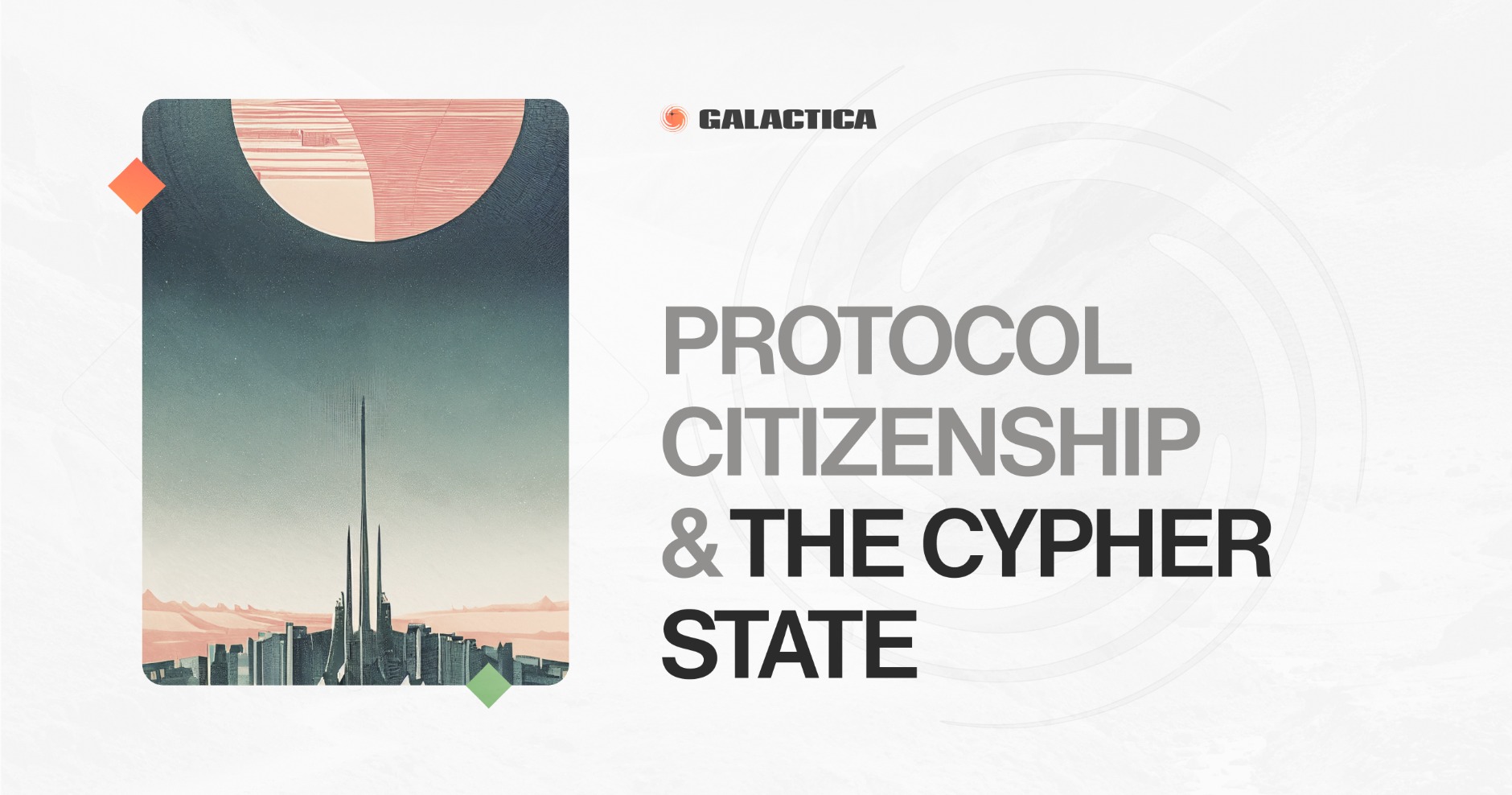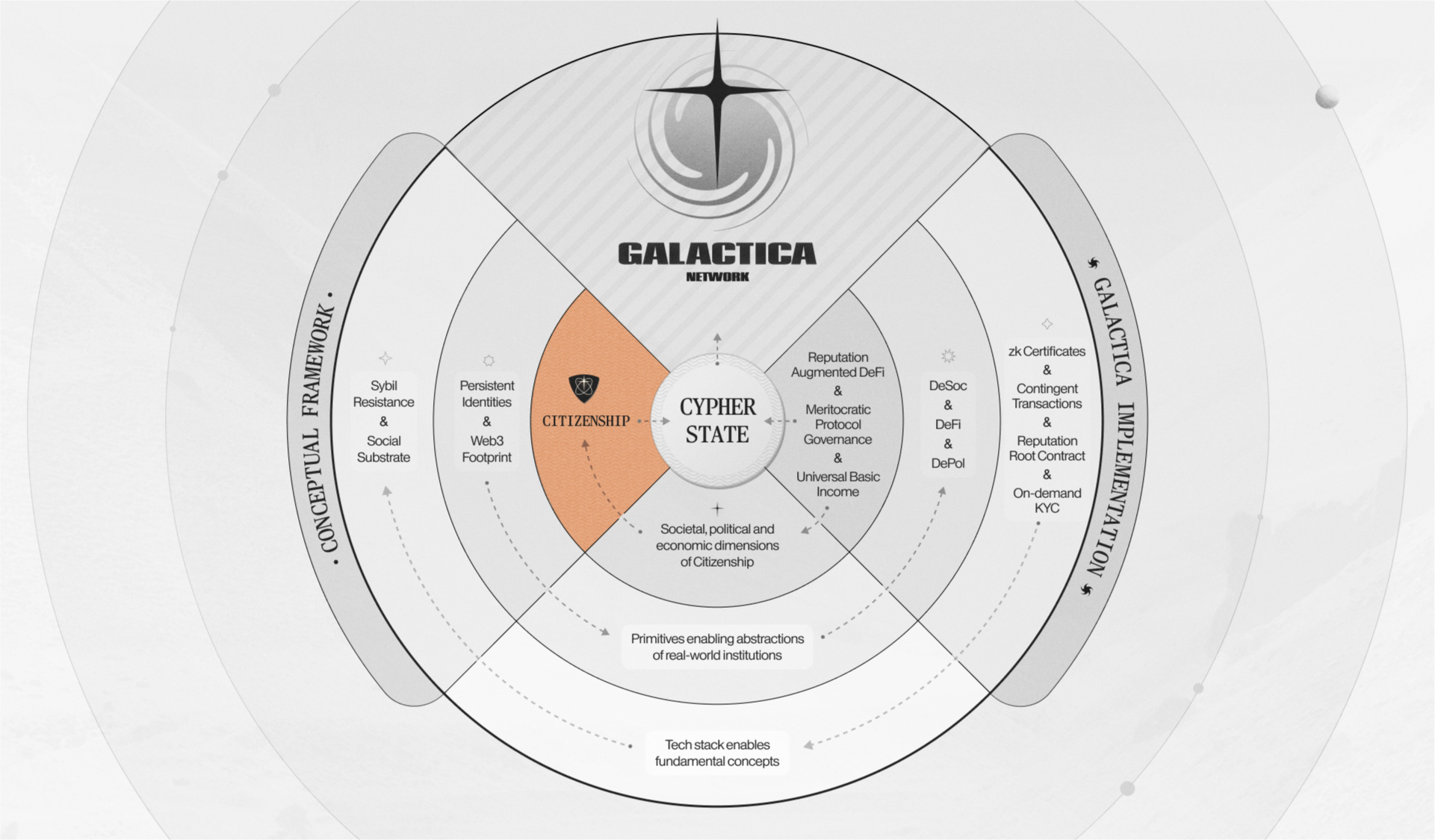


Introduction
Galactica Network is first and foremost, a Cypher State.
In our previous article, we explained several primitives core to the concept of a Cypher State. Let's briefly recoup.
The structural fabric of human society is built around norms and institutions that all have us, humans, as agents. Concepts, such as families, communities, social clubs, celebrities, governors, employees, etc. are similar in their inherent difficulty of transcription to a virtual space. This is especially true for blockchain protocols that have pseudonymity as one of core concepts, ubiquitous across virtually any L1 protocol out there. In other words, today blockchain protocols lack a primitive or a set thereof that is capable of accurately representing the nuance, complexities, and sheer dynamism of human relationships.
As a result, humans cannot be meaningfully represented on-chain.
While the emergence of DeFi has been a massive leap forward, without the ability to model humans, contemporary web3 space is limited to only the most trivial societal and political institutions. Modeling many concepts, such as e.g. quadratic voting remains non-trivial to say the least and in most cases requires reliance on web2 platforms.
DeSoc is the term used to denote the web3 space built around souls - web3 persistent identities each characterized by their web3 footprint.
A human in the blockchain space could be referred to as a Persistent Identity.
The multitude of interactions between any such identity and the rest of the protocol could then be called one's Web3 footprint.\
It is trivial to demonstrate that persistent identities can exist on the protocols with high cost of a Sybil attack. In a self-referential relationship, persistent identities themselves will increase this cost as time goes by and their web3 footprint becomes more complex.
It follows that Sybil resistance (and turing complete virtual machine) of a protocol enables persistent identities and web3 footprint which are in turn the prerequisites for complex societal concepts to be meaningfully represented on-chain.
We argue that historically the most notable societal primitive defining the most meaningful and rich set of a person's rights and responsibilities is that of the Citizenship of a nation state. A protocol sufficiently feature rich to instill meaning into the concept of Protocol Citizenship can be called a Cypher State.
Before proceeding to elaborate on the nature of protocol Citizenship, we would like to introduce the content map for the first set of papers released by Galactica Team. The following graph is simultaneously, a schedule of the content we will be releasing in this series of articles, and a mind-map of the relationships between concepts we introduce in them. We have started by introducing the conceptual framework (leftmost part) underpinning protocol Citizenship and will eventually explain how Galactica Network approaches the practical implementation of it.

Figure 1: Galactica Network Concepts at a glance
Web2: a data dystopia
Explaining the relationship between citizenship, wealth and power distribution and Web2 would require a deep inquiry into the very nature of the state. Such inquiry is available in the Cypher Capital paper published by Galactica Team. For the purposes of this article we will resort to a bare bones summary.
Capitalistic economies eventually degenerate into highly concentrated power and wealth structures. Capitalistic economies existing within the framework of representative democracies and Web2 technological stack fall short of being meritocratic in both power and wealth distribution, and fail to be inclusive in wealth distribution.
Inflation feeds those having access to capital markets while inflating away the wealth of the people. The traditional monetary institutions exist within the framework of Keynesian, (i.e. inflationary) paradigm. Within most of the existing nation states, inflation is a mechanism of wealth redistribution - inflating away the real purchasing power of wages, while inflating asset prices.
Data economy, the infrastructure that ties contemporary society together data monopolies of unprecedented scale and feeds off the deprivation of privacy. In the Information Age we see Web2 as the underlying infrastructure that, while allowing massive informational and thus capital efficiencies, it also is an architecture that enables surveillance - eroding privacy.
Web3: a financial dystopia
Current 'decentralized' protocols governing DeFi today are indeed elite clubs of VCs and large for-profit entities as all crypto projects today solve Sybil resistance only with capital-gating mechanisms where your vote equals your stake. It leads to the centralisation of voting power, plutocracy and indifference of communities to decision making. - Victor, Co-Founder of Humanode
Web3 is an idea and a very powerful one - use cryptography to create the brave new world of fairer institutions, societal, economic, political and monetary. Today, however, its actual implementation is largely a parody of the ideals it is built upon.
We know that the economic and political systems are the pillars upon which mankind's evolution rests. We have established that in their traditional 'physical' implementation, capitalism and representative democracies create highly concentrated power and capital structures [1], which, when formed, lock the system in a self feeding flywheel of adverse distributional effects. What about Web3? Today, it's mostly about DeFi.
Quoting DeSoc, '…[Web3] aspires to transform societies broadly, rather than merely financial systems. […] If Web3 eschews persistent identities, their patterns of trust and cooperation, and their composable rights and permissions, we see, respectively, sybil attacks, collusion, and a limited economic realm of wholly transferable private property - all of which trends towards hyper-financialization.' [2]
Today DeFi, while arguably successful in evading explicit centralization, manifests its own dystopia, and is highly capital inefficient in that [3]. Without an explicitly modeled societal layer, DeFi is a system powered by the most predatory manifestations of capitalism with rent-seeking, collusion, and other forms of power abuse that ends up being no better than traditional markets in its tendency towards the ultimate state of monopoly.
In short, in its politeconomic properties, DeFi is largely a replica of the centralized system it's been created to overshine and eclipse - DeFi suffers the same adversities in power and wealth distribution.
The Institute of Citizenship
In the end all we have now is just a derivative of equity but in a cryptographic form where one stakeholder is able to significantly influence any decision. This is not what we envisioned in public permissionless networks open to everyone. And this is certainly not the way of decentralized coordination of public goods. - Victor, Co-Founder of Humanode
We echo Vitalik's DeSoc [4] and argue that in order to skirt hyper-financialization, Web3 ecosystems need to strive to develop primitives enabling societal substrate of DeSoc. These primitives, however, will enable more than DeSoc - Reputation Augmented DeFi, Meritocratic UBI, DePol and other concepts we will explain in later articles. We argue that the institution that by its very nature is positioned on the intersection of all of them is that of Protocol Citizenship.
Albeit Citizenship is a term without precise definition that has different interpretations both in time and across nation states, we will venture to give it a non-exhaustive definition that would suffice for the purposes of this article. Citizenship links 'a person with the state' and gives people a universal identity - as a member of a nation - besides their identity based on ties of ethnicity or an ethnic self.
As we will illustrate in what follows, Web3 protocols in the presence of persistent identities can be programmed to model the societal, political and economic fabric of a society. We argue that the institute of citizenship is instrumental in explicitly defining the modes of power and wealth distribution.
When there are rights and responsibilities to enjoy and honor respectively, that come as a result of explicitly modeled institutions defining the distribution of power and wealth within a crypto-economic protocol, we can speak of the notion of Protocol Citizenship.
As we have established above, Sybil resistance of a protocol enables complex societal concepts to be meaningfully represented on-chain. Historically, the most notable societal primitive defining a meaningful and rich set of a person's rights and responsibilities is that of citizenship. A protocol sufficiently feature-rich to instill meaning into the concept of Protocol Citizenship can be called a Cypher State.
Figure 2: Adequate Sybil resistance enabling the existence of Persistent Identities
The Cypher State
The next wave of crypto adoption needs a new narrative - more inclusive and less capital dependent. Money is just one side of the equation, participation of motivated individuals outside the core team of developers is what we lack today. - Victor, Co-Founder of Humanode
Owned and governed by its Citizens, Cypher State is a protocol with explicitly modeled social and political institutions.
The definitions and principles that will be described in the following paragraphs will provide a firmer grasp and deeper understanding of the concept of the Cypher State and why it is the central building block of the Galactica Network.
Definitions
Cypher Capital is the aggregate economic and political capital generated within and available to the agents of a decentralized technoeconomic ecosystem;
Cypher State is a decentralized technoeconomic ecosystem defined by a set of persistent identities, smart contracts, and their endowments where the distribution of Cypher Capital is governed by explicitly modeled societal, economic and political institutions;
Cypher State Citizens are persistent identities within the Cypher State that have contingent claims on the Cypher Capital generated therein;
Galactica Network is a Capitalistic Cypher State, characterized by a capitalistic economic setup and a laissez-faire representative meritocratic political framework, optional citizenship and hybrid (capitalistic/socialistic) institutional framework.
Cypher State Principles
Deterministic inflation and dilution by merit: Economic Cypher Capital distribution process integrated into a tiered inflation schedule where Citizen's ultimate inflation induced wealth dilution is a function of one's endowment (i.e. stake) and merit, as proxied by reputation;
Sublinear returns to wealth, linear to merit: Political Cypher Capital of a Citizen is driven by merit and endowment. It's linear in merit and sublinear in endowment;
Merit as a form of Cypher Capital: Reputation, a slice of Citizen's web3 footprint, is an evolving metric. Being an input into one's Voting Power, Reputation is a form of Citizen's Cypher Capital;
Non-alienation of public goods IP: Inflation-funded Public Goods with explicitly modeled generation of on-chain Intellectual Property (IP) and non-alienation of IP created as a result of developing public goods;
Explicit public/private goods transition: Explicit segregation of public and private goods, and explicit modeling of public/private goods transition. Citizens have a claim on the Cypher Capital generated by innovation through Universal Basic Income (UBI) or alternative distributional mechanisms;
Quadratic reputation-augmented UBI: UBI's composition is a diversified innovation portfolio. Cypher Capital is strictly increasing in value in the long term, the more innovation is produced within the network. This innovation, however, needs to remain, at least partially, as the economic capital of its Citizens.
No compromise between compliance and privacy: Citizenship is optional to use the network. Zero-knowledge and MPC cryptography to shield sensitive information and choices of any Citizen. Cypher State is a superstructure built on top of nation states and using its infrastructure as the foundation for Sybil resistance.
Sybil-resistance, which is the ability to define whether there is one human behind the web3 account, maintaining privacy, is the key technology to unlock decentralized societies and broader on chain coordination.
We at Humanode have been building privacy enabled biometric Sybil-resistance to power blockchains free of whale control and give this tech to other projects following the thesis. Finally, the crypto industry is ready to realize the need for a change, and Galactica is among the first ones to step into the new game. - Victor, Co-Founder of Humanode






